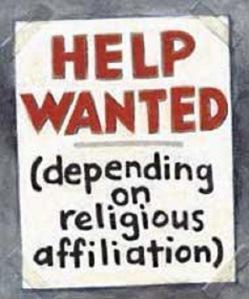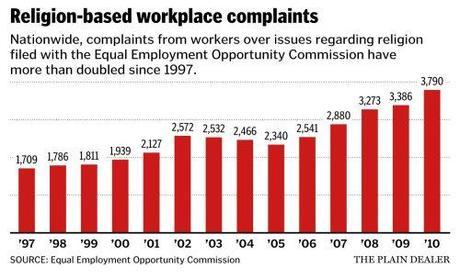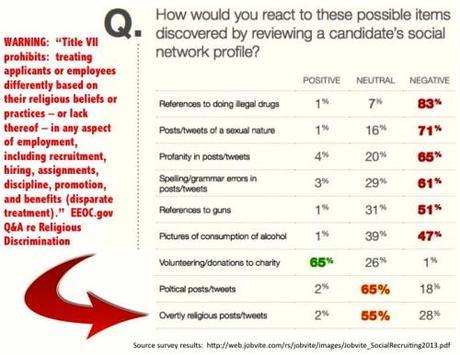 In America, the religious freedom of public sector and most private sector employees is protected by a federal law called “Title VII,” 42 U.S.C. §§ 2000e, et seq.
In America, the religious freedom of public sector and most private sector employees is protected by a federal law called “Title VII,” 42 U.S.C. §§ 2000e, et seq.
Title VII prohibits discrimination based on race, color, sex, religion, or national origin. Religious discrimination includes using an employee’s religion as a factor in decisions to or not to hire or to give or not give promotions, treating employees unequally based on their religion, and harassment.
Two new studies, however, show that if you say you’re religious on a job resumé, your chances of getting a callback are diminished by more than 25%.

David Lewin, head of Berkeley Research Group’s Labor and Employment practice and a professor of organizational behavior at the UCLA Anderson School of Management, said, “These studies do tend to show there will be factors in resumes that will lead to bias. Religion could well be one of them.”
The New England study was conducted between July and October 2009, and involved submitting 6,400 resumes for 1,600 job postings within 150 miles of Hartford, Connecticut.
The study in the South was conducted between March and May 2010, and involved 3,200 resumes sent to 800 jobs posted online within a 150 miles of two “major Southern cities.”
The jobs included positions in customer service, hospitality, media, retail, real estate, shipping and clerical duties. The postings only required an emailed resume.
The researchers used a template of an attractive candidate who had graduated in 2008 or 2009 with a 3.7 or higher grade point average and participation in extracurricular activities. For each job posting, several resumes were submitted with similar templates but with different faith-based information from the following seven types:
- Atheist
- Catholic
- Evangelical Christian
- Jewish
- Pagan
- Muslim
- A fictitious “Wallonian” faith
- A control group for which no religious affiliation was mentioned.
In the New England study, 8.5% of the control group received a phone call or email from a potential employer, compared to an average of 7.5% for the seven religions included in the survey. The fictitious “Wallonian” applicants had an 8.2% rate of return, compared to the 6.5% for Muslims.
For the American South, 18.2% of the control group received a call or email, but the religious candidates averaged 15.7%. Among the religions, Jewish candidates had the highest rate of return, at 16.5%, while Muslims were the lowest, at 10.7%.
Lewin advised that in the “art of resume preparation,” one rule is “unless you have a good reason to put it on, don’t put it on.” Candidates need to consider the value of what is going on their resume, so that something they add is not “something that stands out to an employer as irrelevant or negative.”
The job hunting website Monster.com similarly advises job applicants to consider only including information that will “get your foot in the door. Every bit of information on it should be selling your value to potential employers. You may leave out organization names that disclose your cultural background, religious affiliation, sexual orientation and other possible targets of discrimination.”

~Eowyn

